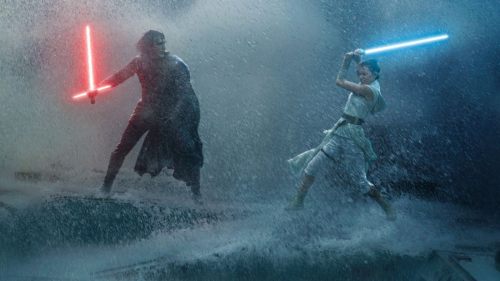Are BLADE RUNNER 2049’s Wallfisch And Zimmer Replicants…Or The Real Deal?
I’m one of those cinephiles who is moderately lukewarm on Ridley Scott’s Blade Runner (1982). I don’t dislike it; however, it’s not among the monuments in my Pantheon of science fiction cinema. I’ve certainly tried over the years to develop a relationship with the film through multiple viewings (of multiple cuts) but there was never enough there to quite reel me in. That didn’t alter the fact I was still extremely intrigued by Denis Villeneuve taking on the challenge of directing a sequel thirty-five years after the release of the original film.
When I first heard the news that Icelandic composer and faithful Villeneuve collaborator Jóhann Jóhansson had been replaced by Benjamin Wallfisch and Hans Zimmer on Blade Runner 2049 (2017), my eyes rolled pretty hard into the back of my skull. I understand the situational need to replace composers on a project, but to swap out one of the more artistic composers in cinema with the most popular composer on the planet was a bit too much to bear. It even diminished my desire to see the film.
Reports were coming in that Jóhansson’s score just didn’t sound “Blade Runner” enough. If that’s true, a different direction would certainly be warranted. Stopping to ponder further, I also understand that when you’re caught in that very difficult position of needing a score at the eleventh hour, you go with the safe bet. The opportunity to experiment had long expired. A mountain of work had to be finished in a short period of time so a decision had to be made to get the job done. Hans Zimmer and his crew have a reputation for bailing out filmmakers as time expires so he was a logical choice to head the replacement. I saw it as a utilitarian move, but not so much an artistic one.
With anticipation tempered, I went to Blade Runner 2049 opening night. It didn’t take long until an overwhelming feeling of awe began to sink into my consciousness. From the first few jaw-dropping frames to the seductive strains of its intoxicating music, I began to realize this movie is truly something special. What I thought would be a film score cultivated from the status quo, turned out to be an ear-opening invitation to infiltrate a world I never wanted to leave.
There were several moments throughout the picture where I felt a reminding twinge of Tron: Legacy (2010), especially when compared to its original film, Tron (1982). Daft Punk did an unbelievable job expanding upon an established musical universe created by Wendy Carlos, while forging a fresh frame of reference fixed on nostalgia. Their music sounded like the aural equivalent of the visual evolution of that particular universe. Although Blade Runner 2049 is a far more artistic film than the “popcorn” enjoyment of Tron: Legacy, I drew this comparison based on how well both of these films expanded their respective universes through its music.
One of the most important traits lost amongst modern film music is its ability to create a unique and justifiably naturalistic world. Scores are so generic and interchangeable that they rarely capture the collective visual, narrative, and aural ideals that make up the characteristics of a particular universe. Music often obfuscates the subtle gradations that every filmmaker tries to infuse into their work and leaves it bathed in commonality.
Unless you’re making a film aping Gremlins (1984), Jerry Goldsmith’s score could never exist in any other movie. It’s so tailor-made to encompass the distinct nuances of that world, and the characters who live in it, that it literally becomes that world. Even Vangelis’ score from the original Blade Runner (1982) so embodies the beautiful ugliness of Rick Deckard’s dystopian society that it’s impossible to separate out the individual threads from the actual quilt. I desperately miss this quality in film music.
The most refreshing and reverential quality of Wallfisch and Zimmer’s score for Blade Runner 2049 is this idea that their music is born from the original film, yet captures all of the idiosyncrasies of this exact world thirty years later. It’s the perfect amalgam of both the past and the future and it so embodies this society that it can’t be easily separated to serve other narratives.
Wallfisch and Zimmer’s music for Blade Runner 2049 is quite simply one of the more forward-thinking, brash, and aurally imaginative scores I’ve heard this year. It’s a sonic gut-punch of industrial despondency intermingled with the beauty of a delicate flower about to bloom. It’s in-your-face when it needs to yet unobtrusive because it has to be. I love the intermittent blasts of sonic color peppered throughout the picture. It doesn’t rely as heavily on thematic development as it does textural evolution which I find fascinating. Coupled with Roger Deakins’ bedazzling cinematography, Blade Runner 2049 is a bountiful feast of aural and visual bliss that kept my brain churning for days.
The film itself is probably a masterpiece (a decision to be reached later upon subsequent viewings). I’ve heard a few mutterings on par with, “It’s not as good as the original,” which is vexing to me. This film isn’t trying to be better than the original. A good sequel only has to make the original better and Blade Runner 2049 accomplishes that with flying colors. For thirty-five years I’ve been mildly apathetic toward Ridley’s Blade Runner. Now that the gaps of its short-comings have been filled in, I see it’s brilliance and its suddenly intoxicating.



